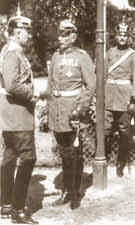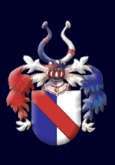|
Kuno
Arndt von Steuben
(09.04.1855 - 14.01.1935)
place of birth: Eisenach, Thüringen (Thuringia)
Königreich
Preußen: OBH, General der Infanterie
General der Infanterie Kuno von Steuben
served Imperial Germany during the Great War as a
corps-level commander on the Western Front, and later as a field army
general in Macedonia. He was distant relative of Friedrich
Wilhelm von Steuben, organizer of
America's military forces during the Revolutionary War. When Germany mobilized in the summer of 1914, von
Steuben was in command of XVIII Reserve Corps which was attached to
Duke Albrecht's Fourth Army during the First Battle of the
Marne. His forces were transferred in 1915 to Crown Prince
Friedrich Wilhelm's Fifth Army, seeing action in the autumn at Champagne,
for
which he was awarded the Pour le Merite from the
Kaiser himself. His corps was also engaged at Verdun
in 1916. In the summer of 1917, von Steuben was transferred to
Macedonia to replace General Arnold von Winckler as commander of the
Eleventh Army, a position he maintained until war's end.
|

|
| Potsdam
1912: General von Steuben meets with the Kaiser |
Kuno Arndt von Steuben was born on 9 April 1855 in Eisenach,
Thuringia, also the birthplace of Johann Sebastian Bach. He was the
eldest son of eight children born to Major General Gottlieb Arndt von
Steuben and Julie Antoinette von Tschirschky und Boegendorff. At the
tender age of 13, young Kuno entered the Imperial Prussian Military
Academy at Oranienstein, transferring three years later to the Imperial
Cadet Institute in Berlin. As a newly-commissioned lieutenant, he began
his military career with Niederrheinisches
Füsilier-Regiment Nr. 39 garrisoned in Düsseldorf. He later married his
regimental commander's youngest daughter, Martha Wilhelmine Franziska
Wesener. Von Steuben spent a good deal of the pre-Great
War years serving on the Great General Staff where he made a reputation
for himself as industrious, conscientious, decisive, yet unassuming.
"...an
absolutely splendid chief of staff."
Field Marshal Alfred von Schlieffen - Prussian Chief of General Staff
(Berlin 1903)
"...a remarkably capable leader and divisional commander, certainly
destined for a higher level of service."
General August von Mackensen - v. Steuben's Corps Cdr (Danzig 1912) |
With these qualities,
he quickly endeared himself to his superiors in Berlin. He served for
four years as Chief of the Military Maneuvers Planning Office, and for
three years as Oberquartiermeister, or Senior
Quartermaster General. As a career staff officer, von Steuben never
commanded at the regimental or brigade level, but when he was promoted
lieutenant general in late January 1911, receiving command of the 36th
Infantry Division in Danzig, he quickly distinguished himself as a
competent front-line strategist.
One year prior to war's breakout, von Steuben was appointed
as Director of the Imperial Prussian War Academy in Berlin. This
posting typically signified the end of one's career, but Chief of
General Staff von Moltke so prized the Generalleutnant's expertise and
leadership, that he appealed directly to the Kaiser to have von Steuben
temporarily promoted general of infantry so that he would later be
transferred to command an army corps. With Germany's general
mobilization, this point quickly became moot as he received command of
XVIII. Reserve Corps. Along with his Chief of Staff, Colonel Fritz von
Studnitz, and two divisional commanders, Lieutenant General Hermann von
Rampacher (21st ResDiv) and Lieutenant General Alexander Torgany (25th
ResDiv), the XVIII. Reserves marched into battle with Duke
Albrecht's Fourth Army as it pushed its way to the River Marne.
They later saw action at places such as Neufchateau,
Tremblois and Charignon.
As the war settled into the trenches, his corps was transitioned to
form the right wing of Crown Prince Wilhelm's Fifth Army. The XVIII.
Reserves were also engaged in the autumn battles in Champage,
for which von Steuben was awarded the Pour le Merite.
Later, during the battle for Verdun, they took part
in the September 1916 attack on Fort de Souville.
|
"...although
cold-blooded in battle, he takes a personal interest in each soldier
and horse under his command. He thus enjoys great popularity among his
subordinates."
Crown Prince Wilhelm - Commander Fifth Army (France, June 1915)
"...bright and capable, his steady and circumspect leadership was tried
and tested through his personal involvement during the many offensive
and defensive engagements."
Friedrich von Scholtz - Commander Army Group von Scholtz (Dec
1917)
|
June 1917 saw von Steuben making his way to
the Eastern Front where he replaced general of infantry Arnold von
Winckler as commander of the Eleventh Army. This army was the legacy of
Field Marshal August von Mackensen and was comprised of both German and
Bulgarian troops. Here von Steuben distinguished himself especially
during the final days of the war as a decisive yet prudent leader. He
thus earned a deep and genuine respect from his subordinate officers
and troops, resulting in the maintenance of a disciplined force even as
the war ended in defeat for Germany.
|

Steuben Coat of Arms
|
General
Kuno von Steuben's three
brothers were also high-ranking German officers during the war: Berndt
was a colonel in the III. Army Corps, Ernst was a lieutenant colonel,
and Anton was a major general. Kuno's only son, Arndt Ernst von
Steuben, served as a general staff officer in the 1st Imperial Guards
Division. After the war, von Steuben officially retired from the
military. In 1931, he was invited by the U.S. government to represent
his family during the 150-year commemoration of the Battle at
Yorktown. Von Steuben died on 14 January 1935 and
is buried at the Invaliden-Friedhof in Berlin.
|
 |
General
der Infanterie |
19.08.1914 |
|

|
Pour
le Mérite |
13.10.1915 |
|